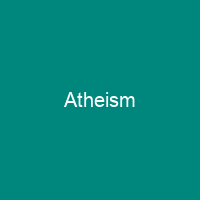Atheism is in the broadest sense an absence of belief in the existence of deities. In an even narrower sense, atheism is specifically the position that there are no deities. Atheism is contrasted with theism, which in its most general form is the belief that at least one deity exists.
About Atheism in brief

Writers disagree on how best to define and classify atheism, contesting what supernatural entities are considered gods, whether it is a philosophic position in its own right or merely the absence of one. A variety of categories have been used to distinguish the different forms of atheism, and whether it requires a conscious, explicit rejection of the idea that there is a god. The ancient Romans accused Christians of being atheists for not worshiping the pagan deities. The first individuals to identify themselves using the word atheist lived in the 18th century during the Age of Enlightenment. The French Revolution, noted for its \”unprecedented atheism\”, witnessed the first major political movement in history to advocate for the supremacy of human reason. Atheists contend that everyone is born without beliefs in deities; therefore, they argue that the burden of proof lies not on the atheist to disprove theexistence of gods but on the theist to provide a rationale for theism. The definition of atheism would include newborns who have not been exposed to theistic ideas and other people who have no idea that deities exist. This broad definition would include newborns with no idea they are not born with the belief in gods. The term atheism emerged first in the 16th century with the spread of freethought, skeptical inquiry and subsequent increase in criticism of religion.
You want to know more about Atheism?
This page is based on the article Atheism published in Wikipedia (as of Dec. 08, 2020) and was automatically summarized using artificial intelligence.







